Your cart is currently empty!
Entrepreneurial Mindset: What It Takes to Succeed
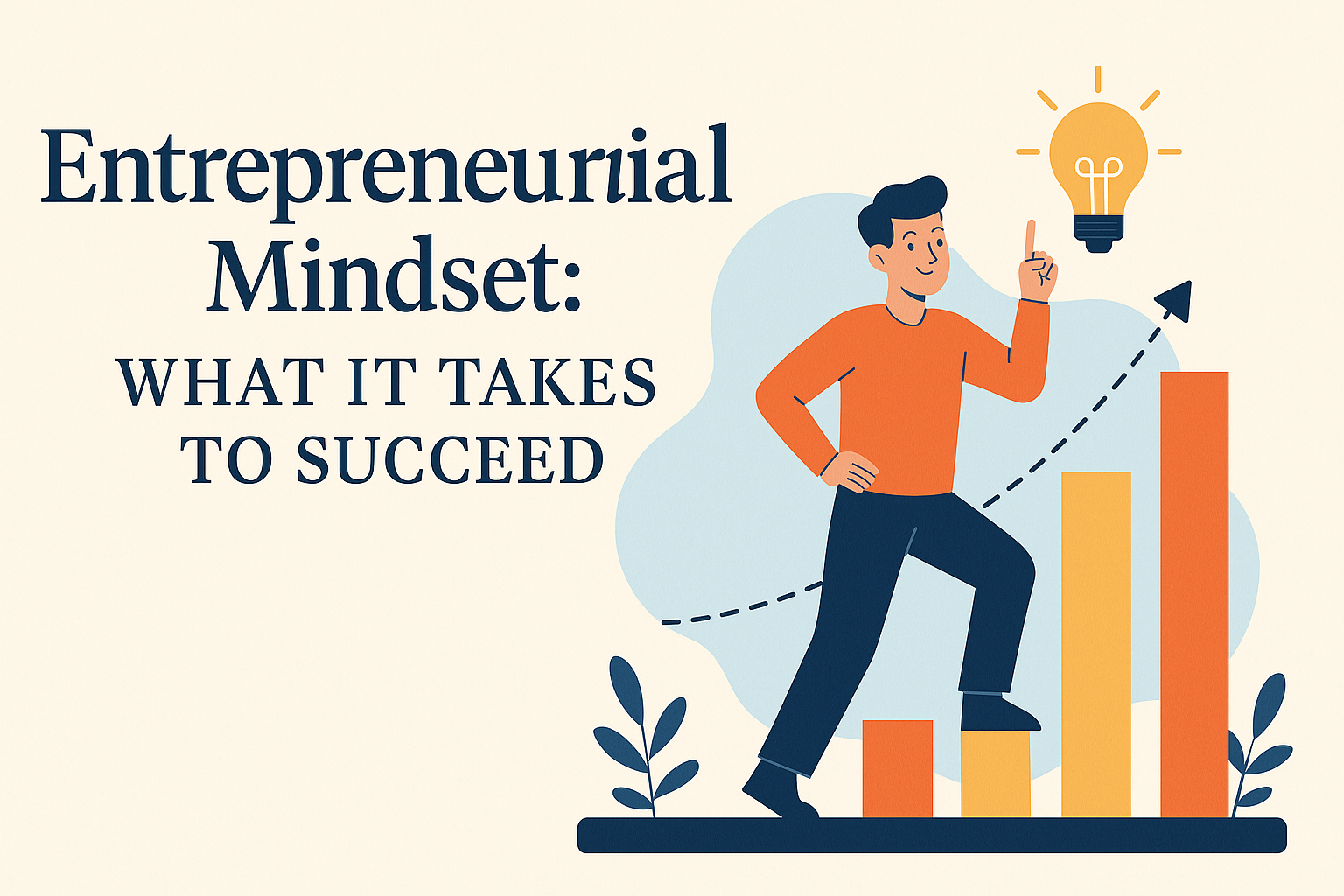
Success in entrepreneurship starts in the mind. Whether you’re launching your first business or just want to grow your thinking, one thing matters more than any business plan: your mindset.
The entrepreneurial mindset isn’t just about working hard or being your own boss. It’s a mental framework that helps you recognize opportunities, take initiative, solve problems creatively, and keep moving forward — no matter what challenges you face.
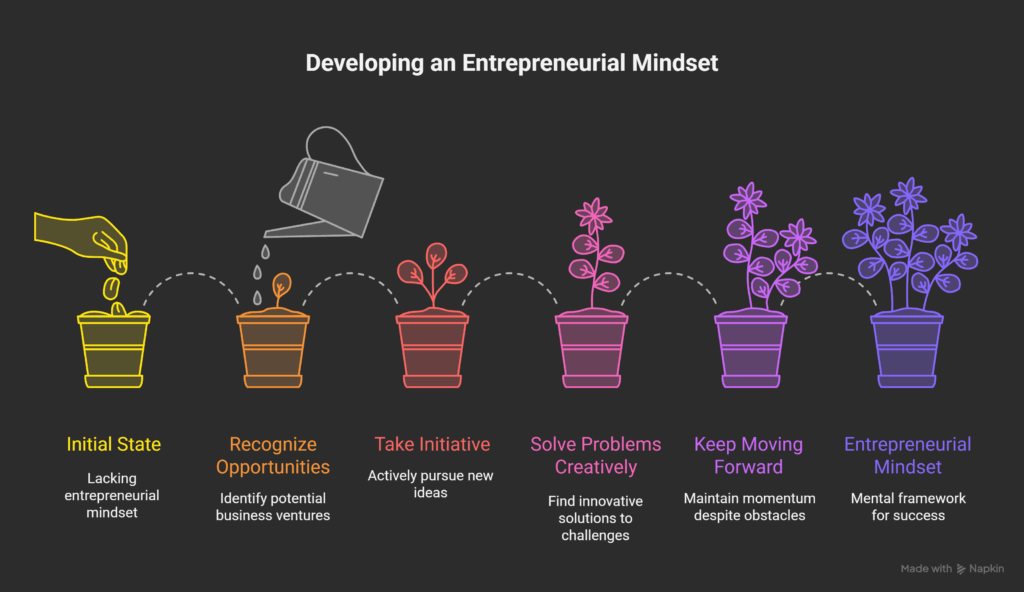
🧠 What Is an Entrepreneurial Mindset?
The entrepreneurial mindset is a way of thinking that focuses on growth, opportunity, responsibility, and action. It’s a mindset that pushes you to be curious, confident, and resilient. This kind of thinking allows people to spot opportunities where others see problems, find solutions when others feel stuck, and keep going when others give up.
It’s not something only “business people” need. It’s useful in everyday life too — from managing finances to solving family problems, to taking charge of your future.
In short, an entrepreneurial mindset is:
- The ability to think positively and creatively
- The drive to take control of your future
- A willingness to take smart risks
- The strength to bounce back from setbacks
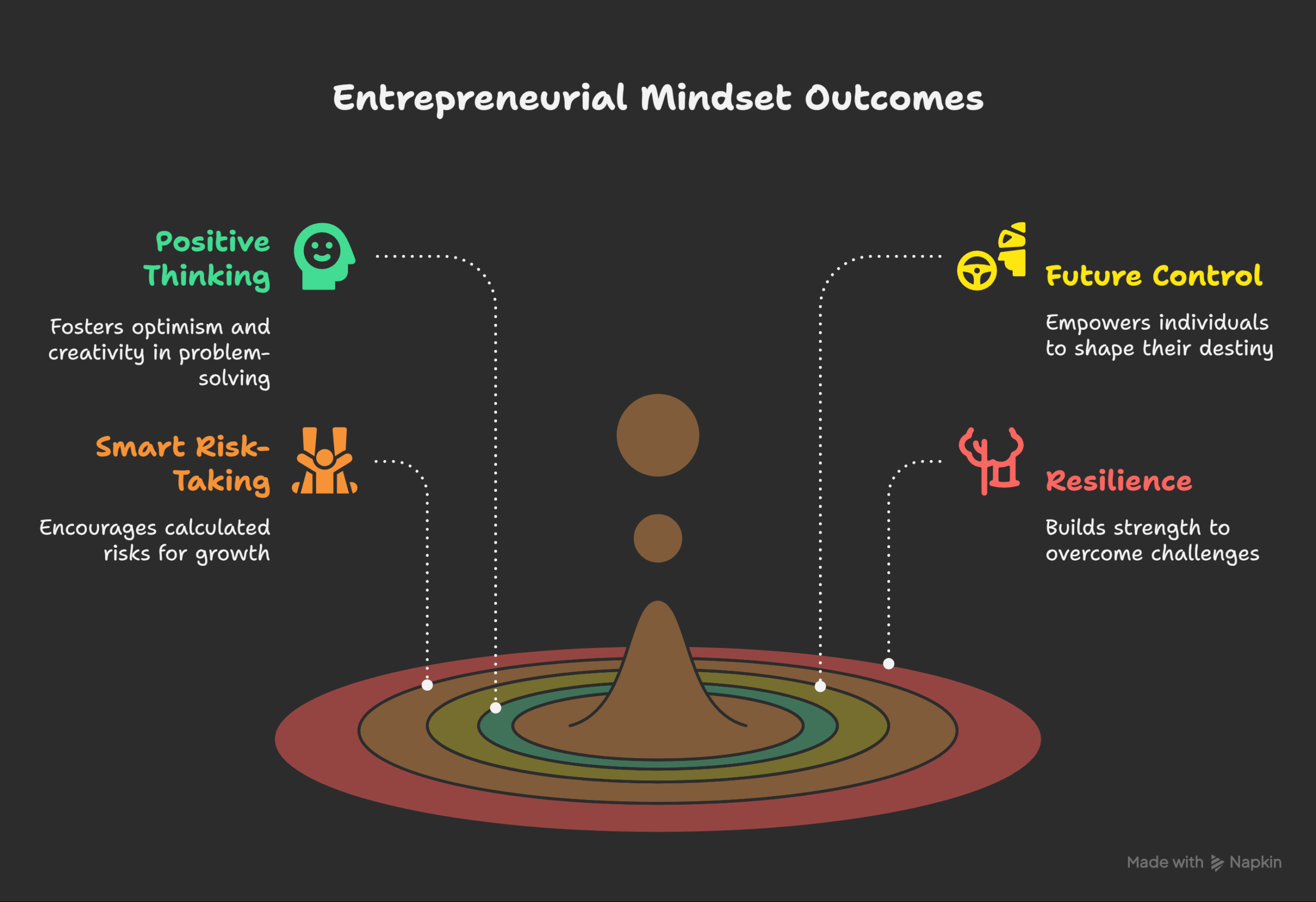
- 🧩 Key Traits of an Entrepreneurial Mindset
1. Curiosity
Curiosity is the habit of asking questions, exploring new ideas, and wanting to understand how things work. Entrepreneurs are naturally curious. They’re always looking for better ways to do things, and they never stop learning.
For example, imagine you notice that people in your neighborhood struggle to find healthy lunch options. A curious entrepreneur might start asking: “Why are healthy options so hard to find?” “What if I started a food truck with healthy meals?” That one question could turn into a business idea.
How to practice curiosity:
- Read books or watch documentaries about different industries.
- Ask “why” and “what if” questions about everyday things.
- Talk to people from different backgrounds to learn new perspectives.
2. Self-Motivation
Self-motivation means having the inner drive to take action without needing someone to push you. Entrepreneurs don’t wait for permission. They see something that needs to be done and do it. They’re goal-oriented and take pride in their progress, even when no one else is watching.
For instance, if you’re building a business, no boss is going to tell you to wake up early, make sales calls, or build a website. It’s all on you. That can be tough, but it’s also powerful — because you’re in control of your success.
How to build self-motivation:
- Set small goals and reward yourself for meeting them.
- Remind yourself of your “why” every day.
- Track your progress to stay inspired.
3. Resilience (Mental Toughness)
Resilience is the ability to recover from failure, disappointment, or stress. Every entrepreneur fails at some point — a product may flop, a partnership may fall apart, or money may run out. What matters is how they respond.
A resilient entrepreneur doesn’t give up. They reflect, learn, and try again — often smarter and stronger than before. Resilience keeps you moving even when you feel discouraged or overwhelmed.
Real-life example: Walt Disney was fired from a newspaper job for “not being creative enough.” He faced multiple business failures before eventually building the Disney empire. Without resilience, none of that success would’ve happened.
How to strengthen resilience:
- Accept that failure is part of the journey.
- After setbacks, ask yourself: “What did I learn from this?”
- Surround yourself with positive, supportive people.
4. Creative Problem-Solving
Entrepreneurs are problem-solvers. But not just any kind — they use creativity to come up with better, faster, or more affordable ways to fix problems. Creative problem-solving means thinking beyond the obvious, questioning assumptions, and being open to unusual ideas.
Take the example of Airbnb. Its founders couldn’t afford their rent, so they decided to rent out air mattresses in their apartment. That simple idea eventually became a global hospitality business.
How to improve creative thinking:
- When facing a problem, list at least 5 possible solutions — even if some seem silly.
- Learn from other industries or businesses and adapt their ideas to your situation.
- Practice “brainstorming without limits” before narrowing down to practical options.
5. Smart Risk-Taking
Taking risks is part of being an entrepreneur — but they don’t just leap without looking. Instead, they take calculated risks, which means they do research, consider the pros and cons, and prepare for different outcomes.
Risk-taking might involve investing your savings into a new idea, leaving a secure job to start a company, or launching a product when you’re unsure how it will be received. It’s scary — but smart entrepreneurs understand that growth only happens when you step outside your comfort zone.
How to take smart risks:
- Start small: test your idea on a small group or scale first.
- Plan for the worst while hoping for the best.
- Think of failure as feedback, not disaster.
6. Responsibility and Ownership
Successful entrepreneurs take full ownership of their work. They don’t make excuses or blame others when things go wrong. Instead, they look at what they can control and focus on doing better next time.
Ownership means treating your business — or even your job or education — like it belongs to you. It’s about being accountable for your decisions, time, and outcomes.
For example, if a customer isn’t happy, a responsible entrepreneur doesn’t say “That’s not my fault.” They say, “Let me fix it.” That kind of thinking builds trust and creates loyal customers.
How to practice ownership:
- Reflect honestly on your actions and their results.
- Focus on solutions, not blame.
- Develop a strong work ethic — do your best, even when no one is watching.
7. Vision and Goal-Setting
Every entrepreneur needs a clear vision — a long-term picture of what they want to build, who they want to help, and why it matters. That vision gives meaning to the work, especially during hard times.
Once you have a vision, you break it down into goals. These goals become your roadmap — they help you focus, measure progress, and stay motivated.
Types of goals entrepreneurs set:
- Short-term goals: Get 10 new customers in one month, build a simple website, or earn your first $100.
- Long-term goals: Open a physical store, launch in another city, or make your business your full-time income.
How to create and reach goals:
- Write your goals down and set deadlines.
- Break big goals into small, daily or weekly tasks.
- Track your progress and adjust your plan as needed.
💪 Skills to Build an Entrepreneurial Mindset
The right mindset needs to be supported by practical skills. These are tools that help you stay focused, make good decisions, and communicate clearly:
Skill Why It’s Valuable How to Improve It
Time Management Helps you stay productive and avoid burnout Use daily planners, set routines, and prioritize tasks
Communication Lets you share your ideas and connect with people Practice speaking, writing, and listening with intention
Financial Awareness Keeps your business stable and allows smart decisions Learn budgeting, basic accounting, and how to price your products
Decision-MakingAllows you to act quickly and confidentlyCompare options logically, make a choice, and reflect afterward
Networking Builds valuable relationships that lead to support, advice, or customers Join events, talk to peers, and be helpful to others
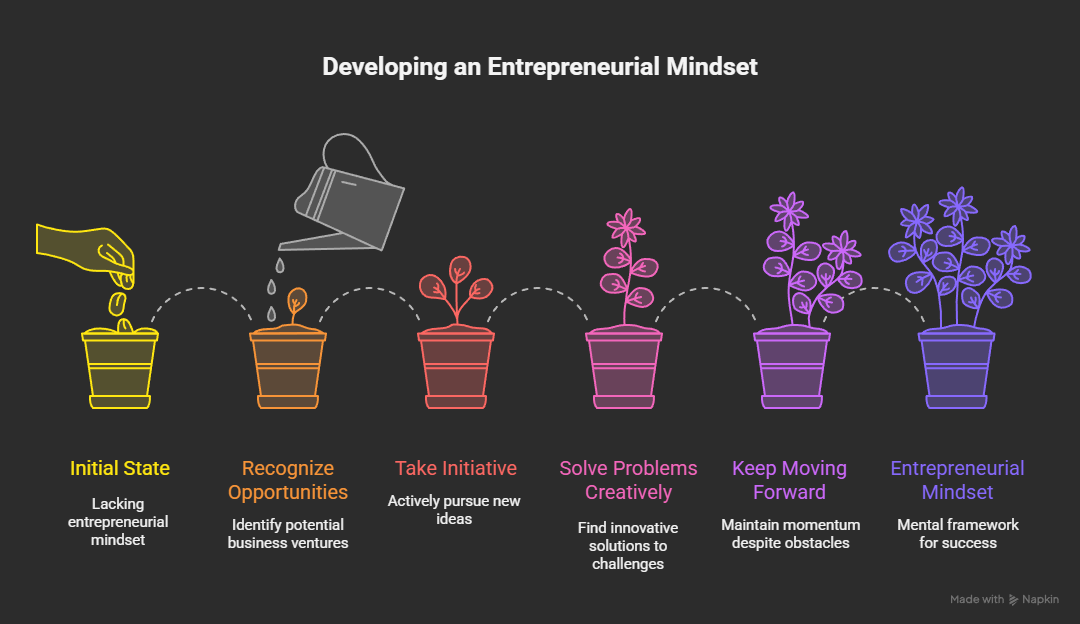
📈 Beginner’s Roadmap: Your First Steps
If you’re starting from scratch, here’s how to get moving with confidence:
Step 1: Start Small and Simple
You don’t need a big loan or fancy office. Start with what you have. Offer a service online, sell handmade products, or test an idea with friends. Start lean and learn fast.
Step 2: Learn Constantly
Read books, watch YouTube tutorials, take free online classes, or follow business podcasts. The more you learn, the better decisions you’ll make.
Step 3: Take Action (Even If It’s Messy)
Don’t wait for everything to be perfect. Take small steps forward. Make the first sale, launch a basic version of your product, or post your first video. You’ll improve by doing.
Step 4: Learn from Mistakes
Treat every mistake like a lesson. After each failure, ask: What went wrong? What can I do differently? Growth comes from trial and error.
Step 5: Be Consistent and Stay Patient
Building something meaningful takes time. Keep showing up. Even if you’re only working on your dream 1 hour a day — that adds up. Be patient, and keep going.
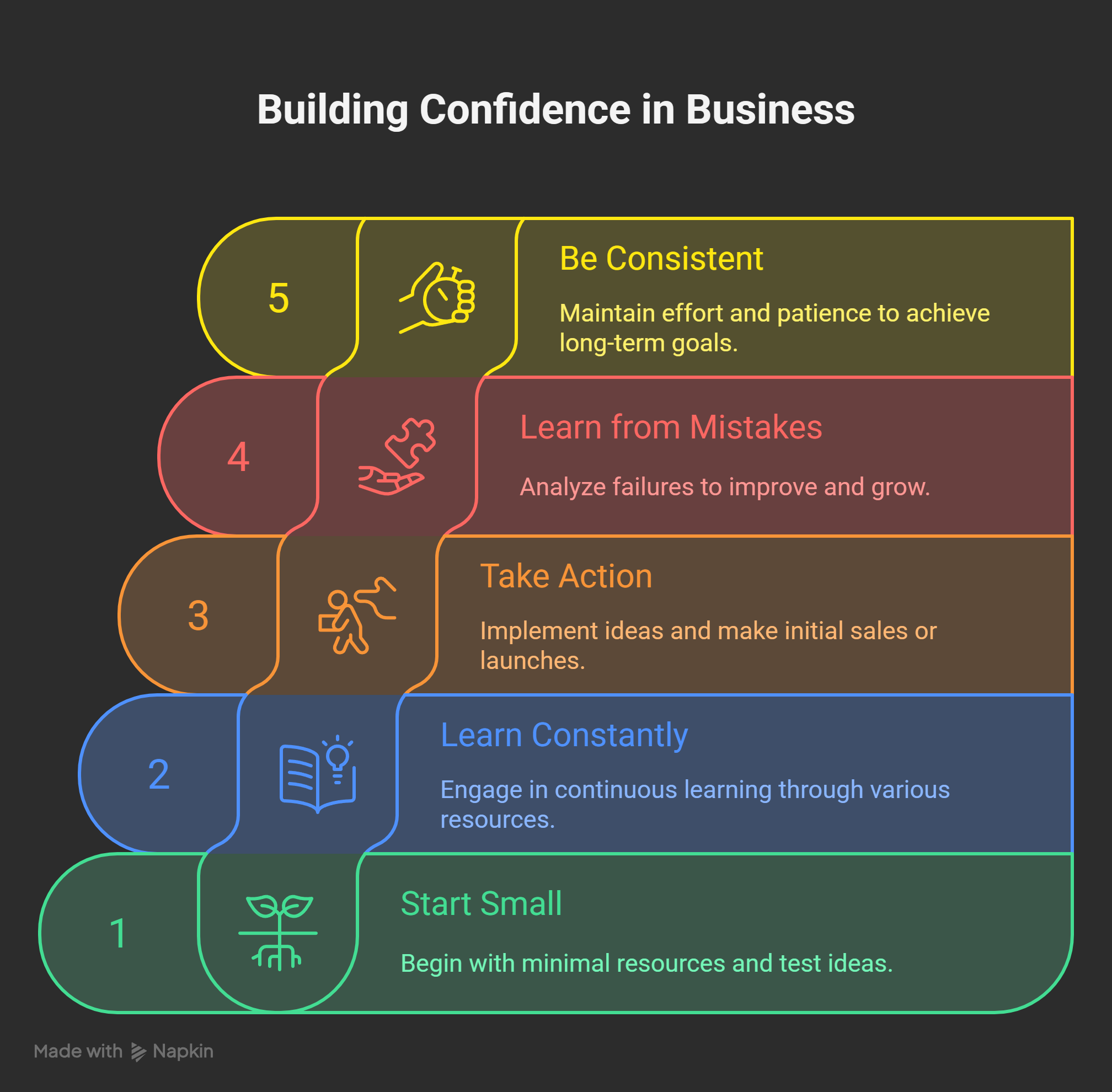
💡 Real-Life Examples of the Entrepreneurial Mindset
- Sara Blakely, founder of Spanx, was turned down by manufacturers for months. She kept going, made a prototype herself, and eventually built a billion-dollar company.
- Elon Musk, despite facing failure after failure with SpaceX and Tesla, continued pushing his vision for clean energy and space exploration. His mindset drove him through massive challenges.
- Daymond John, the creator of FUBU, started sewing clothes at home while working a full-time job. He sold hats on the streets of Queens and slowly built his fashion empire.
What made these entrepreneurs succeed wasn’t luck — it was mindset, resilience, and the courage to keep going.
🚀 Final Thoughts: You Can Develop the Mindset to Succeed
You don’t need a degree in business or a million-dollar idea to start developing an entrepreneurial mindset. You can begin right now by changing how you think and act:
- Stay curious. Learn something new every day.
- Take action. Don’t just plan — do.
- Embrace mistakes. They’re the fastest way to learn.
- Keep going. Success is often just around the corner.
If you want to shape your future, create your own opportunities, and think like a leader — this mindset is your most powerful tool. And best of all: anyone can build it.
Would you like this turned into an eBook, blog series, classroom handout, or something visual like an infographic? I can help format it for any of those!
Leave a Reply